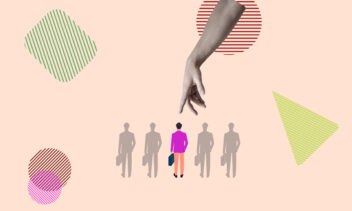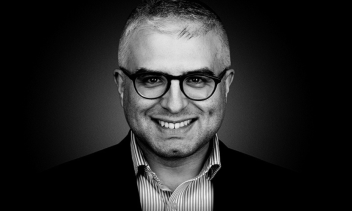I finally hung up the phone and was immediately engulfed in a wave of hopelessness. There is so much pain and such deep dysfunction, I thought to myself, and what could any of us possibly do about it all?
It was at this point that Zoom kindly informed me that I had spent 68 minutes and 12 seconds on the phone with Lauren—and I can attest that it did not feel like a moment shorter. Nothing against Lauren, mind you; anyone would find it difficult to spend 68 minutes listening to someone speak about a topic so full of hurt and tears, and I had already been doing this for months. My conversation with Lauren was one of the final interviews I conducted as part of a large-scale, mixed-methods research study of the shidduch crisis.[1]
There was something needling me about what Lauren had said, a haunting theme encoded in her story that I struggled to decipher amidst my mounting collection of personal stories and sentiments. While I tried to pinpoint it, Lauren’s last words echoed on repeat through my mind.
“Thank you for all your time on this interview!” I said upon completing my eight-question protocol. “But before we end, I have just one more simple question. Is that alright?”
“Sure,” Lauren replied. An established and successful lawyer, she knew how to be gracious.
“Alright, then,” I said. “What am I missing?”
I was met with silence on the other side of the phone, as I had encountered dozens of times before when asking this final, ninth question. My task was clear and simple: Don’t. Say. Anything.
“The loneliest thing,” Lauren began, and I’d willed myself to stay present with her until the very end, “is a fear that, in the Jewish world, I will have no legacy. But that’s not all,” she continued, speaking faster now, as if liberating some inner voice that was usually housed, silently, somewhere deep within her. “I wish that there were more spaces, more respect for the fulfillment that single people have in their lives… Otherwise we just fulfill ourselves elsewhere. And mark my words, it will be a huge loss to the Jewish community because we will just leave… I am just going to leave. And it will have nothing to do with my observance of mitzvos or my relationship with Hakadosh Baruch Hu. It’s just going to be because I don’t have a home.”
It’s just going to be because I don’t have a home.
What struck me the most was that what Lauren said reflected—almost mirrored—interviews I had conducted for weeks and months prior.[2] There were echoes, eerie, troublesome echoes, and I could not ignore them.
I write this in the hope that neither will you.
These conversations pointed to one glaring lesson: When we speak of the “Shidduch Crisis,” we are actually referring to two completely different crises, and confusing the two only makes both crises worse.
What am I talking about? I myself only grasped the meaning of what the single men and women were saying loudly, often, and with a certain heartbreaking vehemence after speaking with Rabbi Shlomo Goldberger of the Shidduch Center of Baltimore. I recall the morning when Rabbi Goldberger leaned back in his chair at his dining room table, took a sip of lukewarm coffee, and proceeded to say something that represents the most practical “call to action” as regards the Shidduch Crisis that I have ever heard.
“When people talk about the Shidduch Crisis,” he said, “they usually refer to the fact that single men and women, by and large, have a hard time accessing shayach [appropriate] dates. They refer to the Crisis of Process, of how men and women meet and how they get set up and how they date. But that,” Rabbi Goldberger proceeded, “is only half the crisis.”
Half the crisis? my mind shouted. Half?!
“The other half,” Rabbi Goldberger continued, “is the ‘Crisis of Experience.’ Single men and women, by and large, suffer while they are single. They feel ostracized from their Orthodox communities, like second-class citizens, like they do not have a place to belong and contribute, like they do not have a home.”
Oh, went my mind. Well. That’s it.
There are two crises. Two different crises. It was what I had been hearing all along; isn’t it what you have been hearing, too? The Crisis of Process describes issues with the system in which single people try to find a spouse: the good and bad of dating websites, the resumes, the Age-Gap Theory, the good and bad singles events, the misunderstandings with shadchanim and community leaders, etc etc. And let me be frank: The men and women I interviewed had a lot to say about the Crisis of Process, and that, friends, is a quagmire that we as a Jewish community will have to wade into eventually and try not to drown.
But the single men and women also had a much different and louder message, a message that carries more hope, a message that applies directly, practically, and always to you, me, your next-door neighbor and your step-aunt, if only we just listened to it. This message was about the Crisis of Experience, about how they feel as part of our Orthodox communities during this stage of life, about loneliness and stuckness, about how they long to show up and be seen as their whole and best selves.
And so here are four things that you can and should do, right now, as a response to this Crisis of Experience. And this is not me telling you what to do: this is them, their voices, their requests of you. They are simple, actionable, and can make a profound difference to how the single men and women around you experience this stage of life.
I. Change the way you talk about us in order to change the way you see us.
The power of changing linguistic conventions is that it also changes how we think about people and therefore how we treat people. Right now, the way that the community views us is clear: when a lady walks into shul with a sheitel she is “a woman”, but while wearing a ponytail she is still a “girl”, no matter her age. When a guy dons a talis he is “a man”- otherwise he remains “a boy”. Additionally, most of us would like to be married: defining the totality of our being as “a single” can feel unjust, hurtful, and blind to the truth of who we are. Like everyone, we desire and deserve respect, and that starts with this very simple request: call us “men and women,” not “boys and girls”; “single men and women” and not “singles”. Reprogramming yourself to speak this way about us will also shift the way you think about us and treat us.
II. Invite me for Shabbos and Yom Tov meals.
The impact of this simple request carries enormous weight. While many households panic slightly at the onset of a three-day yom tov, we panic at the prospect of having to eat out for six meals straight with a smile, relaxed, and engaging, or face the prospect of eating in the silence of our own house or apartment. Invite us to your home for any Shabbos or Yom Tov meal you are able: and not as a chessed project, but as a friend. And if you can, please invite us on Monday or Tuesday and not on Thursday afternoon, which could make us feel like an afterthought. And saying, “You’re always invited, call me if you ever need a meal!” tends to feel insincere at best, and patronizing at worst.
III. Welcome me to shul or other community events and programs with a smile.
While the search for a spouse is at times a winding and lonely journey, sometimes it feels like the hardest part about this stage of life is how we are excluded from the infrastructure of Orthodox life. It is difficult to feel that the first thing people notice about us, and the only thing they seem to talk to us about, is the fact that we are single. When you see us at shul or the supermarket, do not ask about our dating life or wonder why we are still single. Instead, introduce yourself to us with a smile, and ask us the same questions you might ask anyone else; what we do for a living, how long we have been living in your community, etc.
IV. Only give me advice if I ask for it.
So often those who are genuinely trying to help us with the Crisis of Process end up exacerbating our Crisis of Experience. We sincerely appreciate the help we are given from others as we date, but please respect this process as our own. If you suggest a match and we decline it, take our “no” respectfully. Do not offer unsolicited advice or give your opinion about our choices. Do not tell us we are picky or have the wrong priorities because we do not understand what marriage is like. We are always doing our best. If you are particularly concerned, ask whether we have a dating coach or mentor with whom we discuss our choices, and if not, ask if we would like help connecting with one. Respect our response either way.
Channah here, again. Forgive me for taking this one step further, but I want to be completely clear: If you can help by thinking of potential matches for single men and women, all the better. But getting married is the responsibility of the single men and women, not yours. But you also have an essential responsibility in what we refer to as the “Shidduch Crisis”: Make sure that you are not a contributing factor to the Crisis of Experience but rather a positive force for good in the lives of single men and women in your community. To the degree that you can commit to any one of these four requests, you will have become someone who is positively impacting the “Shidduch Crisis” for dozens in your community and helping change the culture of how we treat—and think about—single men and women, now and for years to come.
Channah Cohen has held several positions in the OU, including an Applied Researcher for the Center for Communal Research, a Project Manager for the Department of Community Projects and Partnerships, and a Torah Educator for the Jewish Learning Initiative on Campus. Channah majored in Psychology at Yeshiva University’s Stern College for Women, and was chosen for the Murray Adler Leadership and Vision Award. She completed a master’s degree in Adult Learning & Leadership at Teachers College, Columbia University, and is studying coaching at the School of Positive Transformation. Channah is interested in the intersection of religious education and psychology, and strives to learn and teach means of spiritual living that are resonant with the human experience. She lives in Silver Spring, MD with her husband and three children.
—
- Funded generously by the OU and undertaken by a team of highly qualified researchers: Dr. Matt Williams, Dr. Michelle Shain, Dr. Guila Benchimol, Elisha Penn, and myself.
- Some examples: A grade-school teacher who runs programming for her local shul had said: “It is painful when it’s something that you are hearing from your own community, that you can have an apartment, you can have a great job, you can be involved, you can do chessed, you can be there every step of the way. But if you’re not married, you are a nobody, you’re not a real person, not a real adult.” The young men I spoke with had the same thing to say, although with a slightly different flavor and usually, to give them credit, with the acknowledgment that the experience was even worse for women. “There is a certain amount of hopelessness that develops as a result of the fact that part of our development is essentially beyond our reach,” one young man, a PhD student, had said. “You really don’t mean anything unless you’re married,” another had insisted. “I think the crisis isn’t necessarily that singles aren’t getting married. The crisis is that singles after age 25 feel lost to the Orthodox world.”








